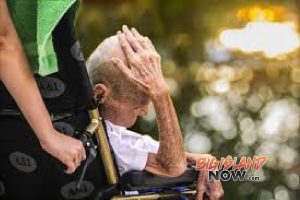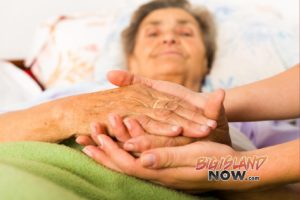Obstacles Surface Due to Hawai‘i’s Aid-in-Dying ‘Safeguards’
 Although seven out of 10 Americans say they would prefer to die at home, in reality, 70% of Americans die in a hospital, nursing home or long-term care facility, according to a recent Hawai`i State Department of Health report.
Although seven out of 10 Americans say they would prefer to die at home, in reality, 70% of Americans die in a hospital, nursing home or long-term care facility, according to a recent Hawai`i State Department of Health report.
In Hawai‘i, thanks to the Our Care, Our Choice Act, which became law in January 2019, terminally ill adults with less than six months to live have a say about how they want to die.
Hawai‘i lawmakers began considering right-to-die legislation soon after it became law in Oregon in 1997. The new law, known as the Our Care, Our Choice Act, makes Hawai‘i the seventh state in the U.S. and the eighth jurisdiction to legalize medical aid in dying. It is also legal in Washington, Montana, Vermont, Colorado and California, as well as in Washington D.C.
The Hawai‘i Department of Health anticipates 40 to 70 patients to ingest a prescription covered under the Our Care Our Choice Act in 2019. When the Our Care Our Choice Act went into effect in Hawai‘i early last year, some terminally ill patients have pushed to change some of the bureaucratic hurdles that the law presents.
 Limitations
Limitations
Laura Varney, CEO of Kona Hospice, said, “I think the entire process will be very difficult for patients. For patients who qualify, there is a long process they will have to go through. Patients and their families will have to learn to navigate that process.”
“The waiting period will impact many terminally ill patients because they may die while waiting… Many patients want to have the medication on-hand to give them a sense of control, ” explained Katherine Werner Brooks, executive director of North Hawai‘i Hospice.
Not only will Hawai‘i residents face the hurdle of having the longest waiting period in comparison to other states that have legalized medical aid in dying, but the fact that the Our Care Our Choice Act is voluntary among health providers, health systems, health plans, hospitals, medical offices, nursing homes, long-term care facilities, pharmacies and hospices is also problematic.
“There are going to be a huge percentage of physicians who just do not want to engage in this,” said Brooks. “However, there will be physicians that support it. So hospices will become familiar with the community physicians who will prescribe and they will be able to provide information and community resources for the patients who wish to access their rights under the law.”
Hospitals are not expected to provide information for patients regarding doctors personal views about this issue, so these patients who are already short on time, may experience “the runaround.”
In addition to the long waiting periods and difficulty terminally ill patients may face in finding a physician willing to write the prescription, there is also the issue of finding a suitable place to self-administer the prescription.
The Queen’s Medical Center in Honolulu says hospitalized patients will not be able to take the lethal drugs at their facilities.
The law specifically requires that the prescription not be taken in a public place. Also, many hospice facilities in Hawai‘i have specific policies against taking the prescription at their facility.
Although these facilities allow their patients to make the choice to seek medical aid in dying, Brooks feels they are “not the appropriate care setting for a terminally ill patient who is no longer wanting curative care.”
“Hospices will only be providing information on how to pursue this avenue,” said Brooks. “Hospices are not going to go through the steps for the patient. Hospices are not going to be allowing their medical directors or hospice physicians to write the prescriptions, are not going to be paying for the medication (it isn’t covered under hospice benefits) and are not going to allow hospice staff to be present when the patient is self-administering.”
However, the vast majority of hospice patients in Hawai‘i are being cared for in their home and have the option to have their hospice workers leave the room.
 Monopolies
Monopolies
While there are two known aid-in-dying medications—secobarbital (Seconal) and DDMP2 (a compounded medication)—there are no pharmacies in Hawai‘i who can make DDMP2 and compounded medications are prohibited from being imported into the state.
Seconal was originally developed in the 1930s as a sleeping pill. In 2009, a lethal dose of Seconal cost less than $200. Over the next six years, it shot up to $1,500,
The pharmaceutical company Valeant that bought Seconal immediately doubled the price to $3,000 one month after California legislators proposed legalizing the process and soon after changed their name to Bausch Health Companies Inc. Since this drug has been around decades, it’s hard to justify the cost hike to research expenses.
Bausch Health Companies Inc. is a multinational specialty pharmaceutical company (based in Laval, Canada) that currently has a monopoly as the only distributor of this lethal prescription in Hawai‘i. The company was also recently criminally investigated by the U.S. Department of Justice for accounting fraud.
 Exclusions
Exclusions
The law requires that a person be over the age of 18, terminally ill (with less than six months to live), competent to make medical decisions and able to administer the medication on their own. These requirements mean a lot of terminal illnesses are automatically disqualified.
Varney said, “It does mean that some will not be allowed to make that choice and I think that is a good thing. When you are talking about a patient, typically an ALS patient who does not have the motor skills to self-administer the medication, it is not legal for anyone else to give it to them. That type of patient usually is very alert and aware of their decline and may want to choose this but it may not be an option for them and I don’t think that’s a bad thing.”
Brooks felt a change in the law might benefit Alzheimer’s and dementia patients.
“Maybe in the future, there will be a way that the law could be changed where a person could make a statement and be recorded while they are still able to make that choice—and that could become the basis for using medical aid in dying for a dementia patient,” Brooks said.
Residents who would like to learn more about the Our Care Our Choice Act can use this online resource. The Hawai‘i Department of Health is another resource for those interested in finding a doctor who won’t opt-out.
RELATED LINKS
DOH Patient & Provider Guidance on ‘Our Care, Our Choice Act’
Healthcare Organizations Need to Prepare for ‘Our Care, Our Choice Act’













